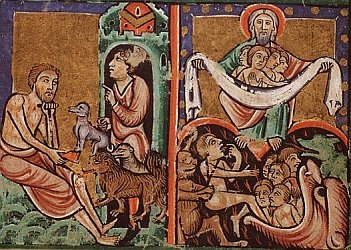An interaction with theological works, as well as my own theological ideas. I invite others to participate with me, to make this more of a well-rounded discussion.
Wednesday, April 13, 2011
The Deepest Poverty
From one of John Chrysostom's sermons on Jesus' parable of Lazarus and the Rich Man:
Do not tell me that he [Lazarus, the poor man] was afflicted with sores, but consider that he had a soul inside more precious than any gold or rather not his soul only, but also his body, for the virtue of the body is not plumpness or vigor but the ability to bear so many severe trials. A person is not loathsome if he has this kind of wounds on his body, but if he has a multitude of sores on his soul and takes no care of them.
Such was that rich man, full of sores within. Just as the dogs licked the wounds of the poor man, so demons licked the sins of the rich man; and just as the poor man lived in the starvation of nourishment, so the rich man lived in starvation of every kind of virtue.
Knowing all these things, let us be wise. Let us not say, "If God loved so-and-so, He would not have allowed him to become poor." This very fact is the greatest evidence of God's love: "For the Lord disciplines him whom he loves and chastises every son whom He receives." And elsewhere it is written: "My son, if you come forward to serve the Lord, prepare yourself for temptation. Set your heart right and be steadfast."
Tell me, if you see any robber-chief prowling the roads, lying in wait for passers-by, stealing from farms, burying gold and silver in caves and holes, penning up large herds in his hideouts and acquiring a lot of clothing and slaves from that prowling, tell me, do you call him fortunate because of that wealth? or unfortunate because of the penalty which awaits him? He may not have been arrested, handed to the judge or thrown in prison, but he eats and drinks extravagantly, he enjoys great wealth. Nevertheless, we do not call him fortunate because of his present visible goods, but we call him miserable because of his future expected sufferings.
You should think the same way about those who are rich and greedy. They are a kind of robber lying in wait on the roads, stealing from passers-by, and burying others' goods in their own houses and banks as if in caves and holes. Let us not therefore call them fortunate because of what they have but miserable because of what will come, because of that dreadful courtroom, because of the inexorable judgment, because of the outer darkness that awaits them.
Let us call fortunate not the wealthy but the virtuous; let us call miserable not the poor but the wicked. Let us not regard what is present, but consider what is to come. Let us not examine the outer garments but the conscience of each person.
James says: "Did not God choose the poor of this world to be rich in faith and heirs of the kingdom which He promised to those who love Him? But you have dishonored the poor man. Is it not the rich who oppress you and personally drag you into court? Do they not blaspheme the fair name by which you have been called?"
The blasphemer of God is the one who claims God by doctrine and belief, but denies Him in his lack of love. Those who have greater resources have the greater responsibility to help those in need. Those who do the greatest injustice by keeping their great wealth for themselves, but blame the poor for their poverty, are those who will be greatly punished by the great Judge of all.
Subscribe to:
Post Comments (Atom)

No comments:
Post a Comment